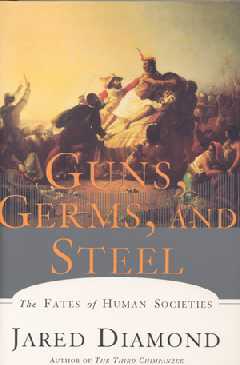 A response to Guns, Germs, and Steel:
A response to Guns, Germs, and Steel: A response to Guns, Germs, and Steel:
A response to Guns, Germs, and Steel:
Someone named Matt ROFLed at my claim that China wasn't expansionist. Below, someone named James (in brackets) and I discuss Matt's postings:
>> But note the [Chinese] expansion was largely land-based despite the fact that the chinese had a pretty good navy until the 15th century. This meant land expansion was necessarily slow. I don't think it was fully addressed why there was little naval expansion. <<
Bingo, James. Matt should've spent his time contemplating the words I chose carefully rather than rolling on the floor laughing his behind off. Asia isn't "other lands," it's the same land. Only Europe managed the large-scale conquest of other lands—meaning other continents.
>> Groups don't 'choose' worldviews. They inherit them and alter them ever so slightly. <<
I'm not sure I agree, or even understand your point. If people inherit their worldview, someone else must've developed the worldview earlier. No matter where it comes from, it comes from somewhere, right?
More important, we can see many examples of worldviews changing. Again, the Chinese were content to stay in the same land (or lands), even building a wall to keep others out. In contrast, Genghis Khan acted to conquer other lands. That wasn't some inherited impulse he had no control over, it was a conscious break from the Chinese cultural pattern.
And all Matt's talk of technological superiority seems irrelevant to this case. For the most part, Genghis Khan succeeded by fighting differently and using his technology better, not by having a technological advantage over his opponents. Technology wasn't the deciding factor; planning and implementation were.
>> Diamond did explain a bit how some worldviews developed, eg: centralisation of China but absence of centralisation in Europe, absence of intracivilisation contact in the Americas, etc. <<
"A bit" sums it up, since Diamond basically punted the point. In fact, he admits China's unity gave it a head start. That's putting it mildly, since Europe's disunity left it mired in the chaotic Dark Ages, fighting innumerable internecine wars. So how did Europe's disunity, which was such a negative factor for more than 1,000 years, suddenly become a positive factor?
Diamond's response is a series of questions he can't answer:
Did a linguistic or cultural factor account for the otherwise puzzling failure of complex Andean civilizations to develop writing? Was there anything about India's environment predisposing toward rigid socioeconomic castes, with grave consequences for the development of technology in India? Was there anything about the Chinese environment predisposing toward Confucian philosophy and cultural conservatism, which may also have profoundly affected history? Why was proselytizing religion (Christianity and Islam) a driving force for colonization and conquest among Europeans and West Asians but not among Chinese?
These examples illustrate the broad range of questions concerning cultural idiosyncracies, unrelated to environment and initially of little significance, that might evolve into influential and long-lasting cultural features. Their significance constitutes an important unanswered question.
Translation: Culture matters. Comparing Europe and China means comparing Christianity and Confucianism, which means comparing different philosophical worldviews. Different worldviews => different choices => different results.
The following reiterates the religion-based difference in worldviews:
In the way of Indian thinking, [religion] could not be a cause for armed conflict. Unlike white men, the Indian did not engage in religious crusades. The Indian did not slaughter large numbers of enemies in the name of a holy spirit. Unlike white men, an Indian tribe did not invade, attack and destroy, or even condemn, other Indians whose persuasions and convictions and ritual contrasted with those it harbored and performed. And unlike white men, Indians made no attempt to force white men to accept and adhere to their beliefs.
Pueblos, Gods and Spaniards, pg. xvii
Let's recap: Diamond did a masterful job of explaining how civilizations arose at different rates. Once they became established, with their distinct cultures and religions, he doesn't have a clue how they maintained or extended their lead. He leaves it for others to prove what I've stated: that different worldviews matter as much as different environments.
His sole guess—that disunity breeds competition, which leads to faster development—is weak. Let's do a simple thought experiment and compare the United States and Europe with South America and Africa. The land masses and populations are roughly similar. Which geopolitical pair was more united and centralized during the last 500 years? Which geopolitical pair did more conquering and colonizing? If disunity is such a long-term advantage, why aren't we all citizens of Greater Africa today?
So much for Diamond's theory. Centralization isn't a drawback when your worldview impels expansion and conquest. It's actually advantageous to have your population pull together toward a common goal. European and American imperialism both provide many examples.
To reiterate: A healthy people with diseases, guns, and steel...and a worldview that presupposes a divine right to conquer the world...will dominate and replace a susceptible people...etc. The previous poster is correct when he said that "morality" or "philosophy" is a factor. And that Diamond didn't address the point.
|
. . . |

|
All material © copyright its original owners, except where noted.
Original text and pictures © copyright 2007 by Robert Schmidt.
Copyrighted material is posted under the Fair Use provision of the Copyright Act,
which allows copying for nonprofit educational uses including criticism and commentary.
Comments sent to the publisher become the property of Blue Corn Comics
and may be used in other postings without permission.